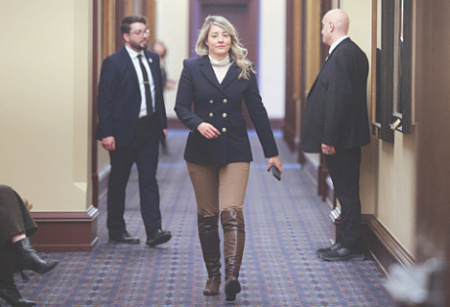
Canada, which holds the presidency of the Group of Seven this year, will hold a meeting of foreign ministers on March 12-14 in Charlevoix, Quebec. Her goal is to prepare for the June summit, which will be held at a ski resort in Kananaskis County. During the preparation of the final documents of the ministerial meeting, the United States insisted on tougher language towards China and softening rhetoric towards Russia.
This year, the G7, which includes the United Kingdom, Germany, Italy, Canada, the United States, France, Japan, as well as the EU as an association, will celebrate its half-century anniversary. During this time, Canada has chaired it six times. The seventh G7 summit, organized by Canada, will be held on June 15-17 in Kananaskis, Alberta.
By the way, the summit will be held there for the second time. In 2002, the ski resort hosted the leaders of the “big Eight” at that time, which included Russia.
As the host of the summit, Canada named the sustainable development of the global economy, countering climate change and responding to the rapid progress of technology as its priorities in the G7. As for the meeting of the foreign ministers opening on Wednesday, according to the website of the Canadian presidency, the ministers will discuss further support for Ukraine in its conflict with Russia, the situation in the Middle East and the Indo-Pacific region, the crises in Haiti and Venezuela, and security in Africa.
On the eve of the meeting, Canadian Foreign Minister Melanie Joly told CTV that Ottawa expects to preserve the unity of the G7 countries on global security issues, including the situation in Ukraine. She stressed the importance of working together on key issues on the international agenda and coordinating the actions of the G7 participants.
However, the thesis of achieving unity is questionable already because the participation of US Secretary of State Marco Rubio in the meeting is aimed at promoting the foreign policy agenda of President Donald Trump under the slogan “America first!”. In any case, that’s what State Department spokeswoman Tammy Bruce said about her boss’s mission.
In this regard, discussions are inevitable in Charlevoix that Canada is under pressure from its only land neighbor and largest partner, the United States. Trump not only provoked a new round of tariff war with Canada, but also called on it to join the United States as the 51st state. In Ottawa, the initiatives of the American president are perceived as a serious threat to the sovereignty of the state. “Donald Trump, as we know, has imposed unreasonable tariffs on what we build, what we sell, and how we make a living. He’s attacking Canadian families, workers, and businesses. We cannot allow him to succeed, and we will not allow him,” said the recently elected chairman of the ruling Liberal Party, Mark Carney, to whom outgoing Prime Minister Justin Trudeau will soon hand over the reins of government.
Russia may become another cause of discord within the G7. Rubio has already spoken out against the wording in the statements of the “seven”, which could complicate the process of peace negotiations between Russia and Ukraine. “We feel that the language of antagonism sometimes makes it difficult for the parties to come to the negotiating table, especially since we (the United States. – “NG”) are now the only ones who seem to be able to make such negotiations possible,” Reuters quoted the Secretary of State as saying.
According to agency sources, Canada initially hoped that the ministers would agree on a final communique on international security, as well as a declaration outlining the G7’s efforts to counter Russia’s so-called shadow fleet. However, it will not be easy to find a compromise on these issues. After all, the United States intends to remove references to sanctions and Russia’s military actions in Ukraine from these documents, which the rest of the elite club members are ready to argue with.
The United States also blocked Canada’s proposal to create a special working group within the G7 to eliminate loopholes in anti-Russian sanctions. Her task, according to Bloomberg, would be to combat the shadow fleet transporting Russian oil, bypassing the restrictions imposed by the “seven” at the end of 2022.
At the same time, the United States is pushing for tougher language regarding Beijing’s actions, in particular, by explicitly mentioning China as a violator of maritime security. Among other things, Washington demanded that the text of the declaration include references to the risks to “life and livelihood” caused by Beijing’s actions to “ensure illegal maritime claims.”
However, according to The British The Guardian, the drafts of both documents are not final. Negotiations may end with the introduction of certain changes to the communique. Although in February, the G7 countries failed to issue a statement on the occasion of the three-year anniversary of their conflict in Ukraine (see NG dated 02/25/25). According to Joly, she does not recall a case when the G7 participants discussed any document so “intensely”. And as a result, it was never agreed upon.
